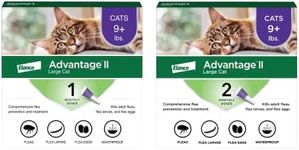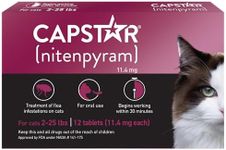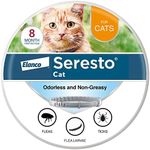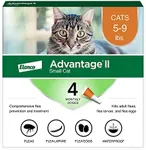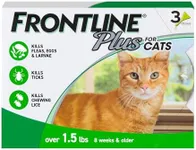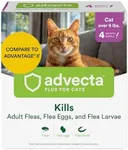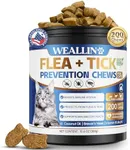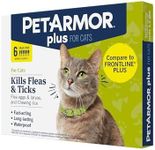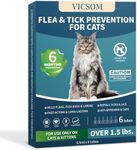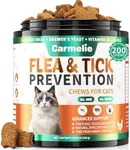Buying Guide for the Best Most Effective Flea Treatment For Cats
Choosing the most effective flea treatment for your cat is crucial for their health and comfort. Fleas can cause a range of issues from mild irritation to serious health problems. When selecting a flea treatment, it's important to consider various factors such as the type of treatment, the age and weight of your cat, and any potential allergies or sensitivities. Understanding the key specifications of flea treatments will help you make an informed decision that best suits your cat's needs.Type of TreatmentFlea treatments come in various forms including topical treatments, oral medications, collars, and shampoos. Topical treatments are applied directly to the cat's skin and are effective for a month. Oral medications are ingested and can provide quick relief, often within hours. Flea collars offer long-term protection, usually lasting several months. Shampoos can provide immediate relief but may need to be used frequently. Choose the type based on your cat's lifestyle and your convenience. For instance, if your cat dislikes baths, a topical or oral treatment might be more suitable.
Active IngredientsThe active ingredients in flea treatments are what kill or repel fleas. Common ingredients include fipronil, imidacloprid, and selamectin. These ingredients work in different ways to eliminate fleas. It's important to choose a treatment with an ingredient that is effective against the specific flea problem your cat is facing. If your cat has had adverse reactions to certain ingredients in the past, avoid those and consult your vet for alternatives.
Age and Weight of CatFlea treatments are often formulated based on the age and weight of the cat. Kittens and smaller cats require different dosages compared to adult or larger cats. Using the wrong dosage can be ineffective or even harmful. Always check the product label to ensure it is suitable for your cat's age and weight. If you have a kitten, look for treatments specifically designed for young cats.
Duration of EffectivenessThe duration of effectiveness varies between products. Some treatments offer protection for a month, while others can last up to eight months. Consider how often you are willing to reapply the treatment. If you prefer less frequent applications, a long-lasting collar or a monthly topical treatment might be ideal. For immediate but short-term relief, shampoos or oral medications can be effective.
Ease of ApplicationThe ease of application is an important factor, especially if your cat is not cooperative. Topical treatments are generally easy to apply but require the cat to stay still for a moment. Oral medications can be mixed with food but may be challenging if your cat is a picky eater. Collars are easy to put on but may be uncomfortable for some cats. Choose a method that you and your cat are comfortable with to ensure consistent treatment.
Potential Side EffectsAll flea treatments have the potential for side effects, ranging from mild skin irritation to more serious reactions. It's important to monitor your cat after applying any treatment. If you notice any adverse effects, discontinue use and consult your vet immediately. Reading reviews and consulting with your vet can help you choose a product with minimal side effects.
